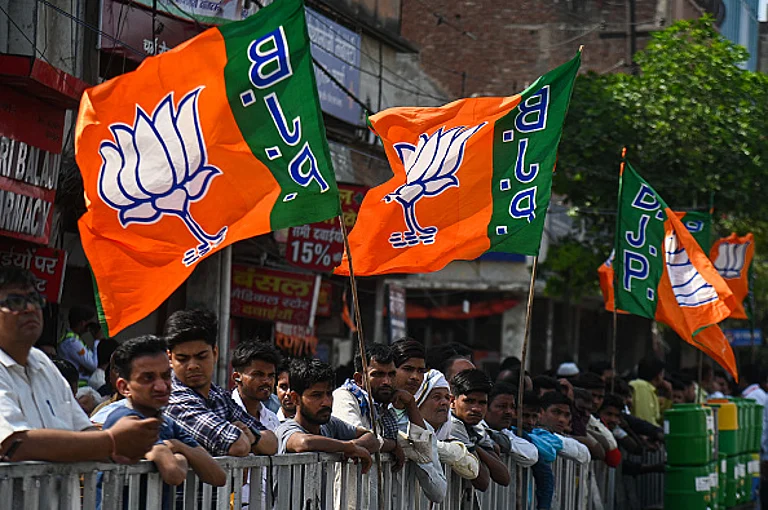The Mayawati-led Bahujan Samaj Party, once an elephantine force in Uttar Pradesh politics, has experienced a decline in influence as its core support base of Dalits continues to shift its allegiance to other parties.
Timeline: Tracing The Journey Of Bahujan Samaj Party
Outlook traces the journey of BSP from its inception to its current political standing as Lok Sabha polls approach.
The Bahujan Samaj Party was social reformer Kanshi Ram’s brainchild which he founded in 1984, with the primary goal of representing and uniting the Bahujans. The term "Bahujans" refers to individuals from Scheduled Castes, Scheduled Tribes, Other Backward Castes, and religious minorities. Collectively, these groups made up 85 per cent of India's population, yet were divided into 6000 different castes.
Outlook traces the journey of BSP from its inception to its current political standing as Lok Sabha polls approach.
April 14, 1984: The Bahujan Samaj Party (BSP) was founded by Kanshi Ram on the birth anniversary of dalit icon B R Ambedkar. The party was inspired by the ideas of Ambedkar and within a short span of time it became a party led and backed by dalits. The Backward and Minority Central Government Employees Federation (BAMCEF), which was established in the late 1970s was the precursor to BSP. BAMCEF was a coordinating committee of Dalits based in a government research centre in Pune, in which Kanshi Ram played a crucial leadership role.
1993: The Bahujan Samaj Party (BSP) first allied with the Samajwadi Party (SP) in 1993, when the two parties formed a coalition government in Uttar Pradesh. Samajwadi Party’s Mulayam Singh Yadav became Chief Minister.
1995: The SP-BSP alliance, which had formed the government along with the support of other parties, collapsed in 1995 when rifts started appearing due to disagreements over the distribution of power and the infamous Meera Bai Marg guest house incident wherein SP workers allegedly misbehaved with Mayawati. Mayawati served as Chief Minister from June 1995 to October 1995 with support of BJP.
1997-2003: Mayawati served as the UP on two more occasions: for six months in 1997 and another 15 months in 2002–03.
2001: Kanshi Ram names Mayawati as his political successor.
2007: The Bahujan Samaj Party (BSP) achieved a historic victory in the Uttar Pradesh (UP) assembly elections, winning 206 seats and becoming the sole majority party. Mayawati was sworn in as Chief Minister for the fourth time without any support of a second party, marking the peak of the party's electoral success.
2009: BSP registered its best performance in Lok Sabha polls winning 20 seats, closely trailing behind the SP with 23 seats and the INC with 21.
2012: In 2012 state elections the party could only manage to win 80 seats. SP’s Akhilesh Yadav took over as CM.
2014: The party faced a major setback, failing to secure even a single seat in the Lok Sabha polls.
2017: BSP’s seat tally went from 80 to 19 in the 2017 state elections.
2019: In 2019, the BSP-SP alliance managed to secure 15 seats, with the BSP winning 10 in the 2019 general elections.
2022: BSP only managed to secure one seat in the 2022 state polls.
Tags

